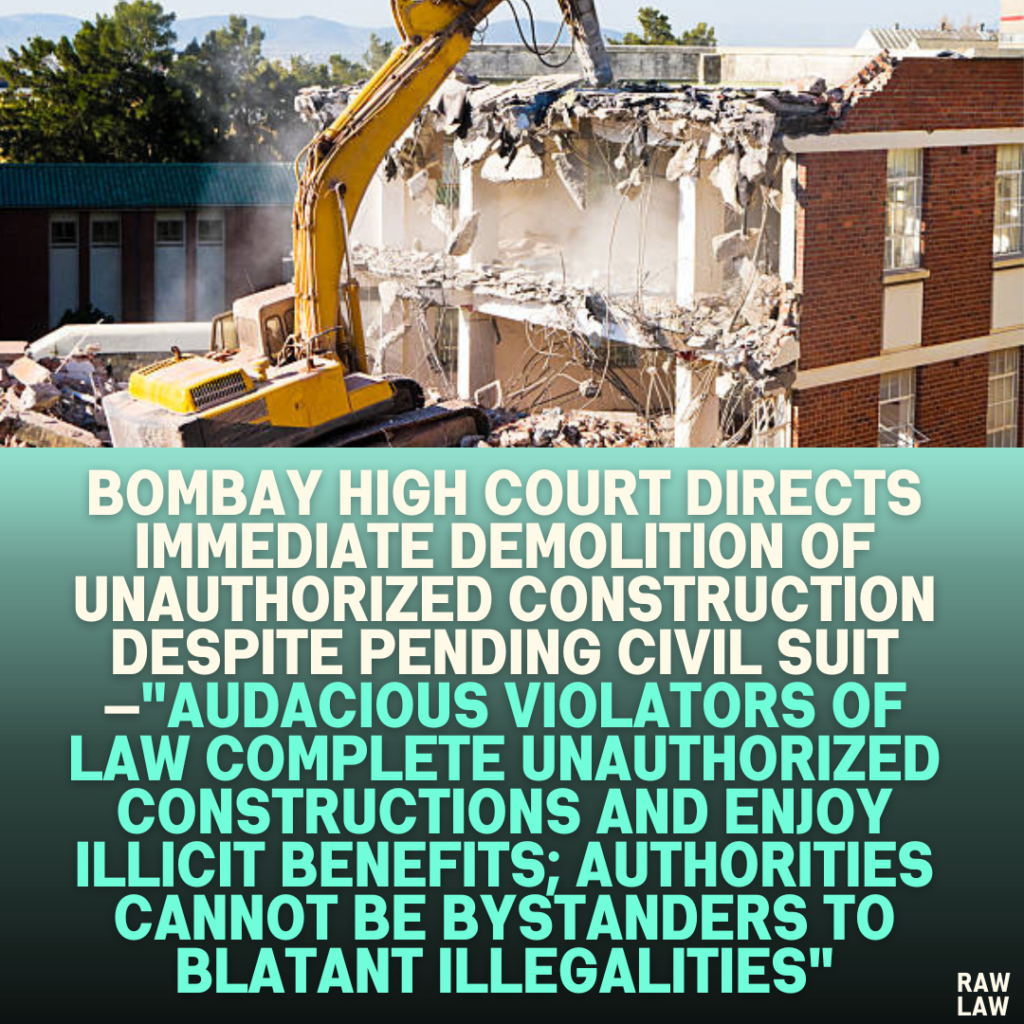Court’s Decision
The Bombay High Court issued a directive to the Baramati Municipal Council (BaMC) to demolish the unauthorized construction by the second respondent (neighbor) within one week from the uploading of the judgment. The court clarified that the pending civil suit and the injunction order from the civil court did not bar the BaMC from implementing its notices for demolition under the applicable laws. It rejected the second respondent’s plea for a stay on the demolition to file an appeal in the Supreme Court, as the construction was found to be wholly unauthorized.
Facts of the Case
- Background:
- The petitioners, flat owners in Baramati, approached the Bombay High Court through a writ petition under Article 226 of the Constitution of India.
- They sought action against their neighbor (second respondent), who was constructing a building without obtaining necessary permissions or sanctions.
- Unauthorized Construction:
- The construction on Plot No. 223 was claimed to obstruct the petitioners’ right to natural air and light.
- Complaints were lodged with BaMC, prompting site inspections and notices issued to the second respondent under Section 54 of the Maharashtra Regional and Town Planning Act (MRTP Act).
- Despite the notices and an FIR lodged against the respondent, the construction continued unabated.
- Civil Court Injunction:
- The petitioners filed a civil suit and obtained an injunction order restraining the respondent from further construction. However, BaMC misunderstood this order as a stay on its demolition actions and failed to act against the illegal structure.
Issues Before the Court
- Whether the unauthorized construction could be allowed to continue despite the lack of permissions and the civil court’s injunction.
- Whether BaMC was justified in halting the demolition based on a misinterpretation of the civil court’s order.
Petitioner’s Arguments
- The petitioners contended that the unauthorized construction violated their rights, particularly the obstruction of natural air and light.
- They alleged that BaMC’s failure to act decisively against the second respondent enabled continued illegal construction.
- They emphasized that the civil court’s order only restrained further construction but did not bar BaMC from demolishing the illegal structure.
Respondent’s Arguments
- Second Respondent:
- Argued that the writ petition was not maintainable due to the pendency of civil proceedings.
- Claimed that as the owner of the plot, they did not require permissions for construction and asserted that the construction was almost complete.
- BaMC (Municipal Council):
- Submitted that demolition was not carried out because it interpreted the civil court’s order as a restraint against action.
- Admitted that this interpretation was based on caution rather than legal certainty.
Analysis of the Law
- MRTP Act and Municipal Laws:
- The court analyzed the powers conferred on municipal authorities under the MRTP Act and the Maharashtra Municipal Corporation Act, 1949. These laws empower municipalities to act decisively against unauthorized constructions.
- Section 54 of the MRTP Act enables municipal authorities to stop and demolish unauthorized constructions. The court observed that BaMC was duty-bound to enforce these provisions and had failed to act appropriately.
- Civil Court’s Jurisdiction:
- Referring to the precedent of Commissioner, Akola Municipal Corporation v. Bhalchandra Govind Mahashabde (2013), the court reiterated that civil jurisdiction is excluded where statutes provide specific remedies.
- The civil court’s order restraining further construction did not imply a stay on BaMC’s enforcement actions, and BaMC should have sought clarification rather than assuming such a restraint.
Precedent Analysis
- Commissioner, Akola Municipal Corporation v. Bhalchandra Govind Mahashabde (2013):
- This case clarified that civil courts lack jurisdiction in cases where statutes provide special remedies for enforcement. The court criticized BaMC for failing to highlight this legal principle earlier.
- High Court on its Own Motion v. State of Maharashtra (2024):
- In this case, the Bombay High Court rejected the argument that ownership of land negates the need for municipal permissions, emphasizing that statutory compliance is mandatory.
Court’s Reasoning
- Criticism of BaMC’s Inaction:
- The court strongly criticized BaMC for misinterpreting the civil court’s injunction as a bar against demolition. It stated, “The Respondent No. 1 is the executing and implementing authority. They cannot be seen to be by-standers in a litigation which stems from an illegality.”
- The court noted that BaMC had acted vigilantly before the civil court’s order but subsequently became complacent, which emboldened the second respondent.
- Unauthorized Construction is Rampant:
- The court highlighted the growing problem of unauthorized constructions in Maharashtra, stating that violators complete illegal structures during prolonged legal proceedings and reap illicit benefits.
- It observed that this trend undermines the rule of law and sets a bad precedent for others to flout regulations.
- Respondent’s Defiance:
- The court found the second respondent’s arguments baseless, particularly the claim that ownership negates the need for permissions. It emphasized that the construction was unauthorized and continued in blatant defiance of municipal notices and court orders.
Conclusion
The court allowed the writ petition and directed BaMC to demolish the unauthorized structure within one week. It rejected the second respondent’s plea to stay the demolition order for four weeks to approach the Supreme Court, citing the flagrant illegality of the construction. The court also scheduled a compliance hearing to ensure the order was implemented.
Implications
This judgment serves as a stern warning to municipal authorities and violators of construction laws. It underscores the need for prompt enforcement of statutory provisions to deter unauthorized constructions. The court’s decision highlights the judiciary’s role in upholding the rule of law and preventing the misuse of legal proceedings to perpetuate illegal activities.




Pingback: Delhi High Court Directs Issuance of Nil Deduction Certificate to SFDC Ireland: “No Material Change from Previous Year’s Ruling; Withholding Tax Unjustified” - Raw Law
Hi, yeah this ρoѕt is actually good and Ι have learned
lot of things from it regarding blogging.
thanks.